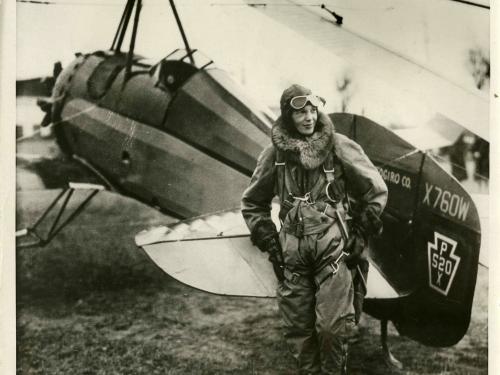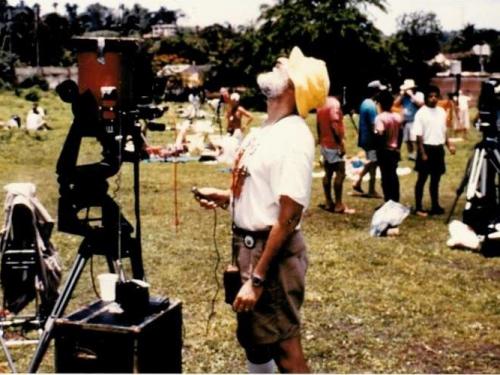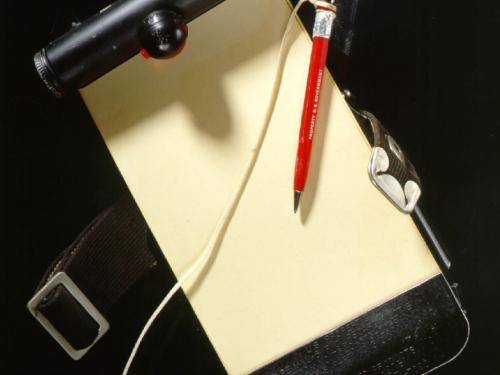
Stories of daring, stories of technological feats, stories of prevailing against the odds ... these are the stories we tell at the National Air and Space Museum. Dive in to the stories below to discover, learn, and be inspired.
Showing 991 - 1000 of 1761

July 01, 2017
The weather is getting warmer. Summer is upon us — and that means we will have plenty of visitors eager to explore the soaring planes and spacecraft at the Museum. To make your visit more enjoyable over the July 4th holiday, here are some tips to make your experience a great one:

June 29, 2017
On May 21, 1937, record-setting pilot and celebrity Amelia Earhart set out to become the first woman to fly around the world. She has been missing ever since.

June 23, 2017
A fan of what he calls “the older stuff,” librarian Phil Edwards shared with me seven of the library’s most prized possessions and lesser-known gems just in time for Museum Week’s Book Day (#BooksMW).

June 21, 2017
You wouldn’t think flying and music go hand in hand, but they do. Luckily for all the music-loving aviators out there, Bella Landauer, a veteran collector whose son was a pilot, began searching for aeronautical-themed sheet music in the early 1920s. Landauer scoured shops, publishing houses, auctions, and other private collections for records and their respective covers, usually illustrated with biplanes or famous pilots like Charles Lindbergh and Amelia Earhart.

June 20, 2017
What do baseball, hockey, and football have in common? Hint: It’s more than just the roar of the crowd or competitive all-star athletes. Each sporting event has some connection to aviation and spaceflight—yes, spaceflight.
Our intrepid archivist, Elizabeth Borja, has been exploring this connection for years. Whether it’s the testing of spacesuits at a baseball game or the New York Yankees flying on a Douglas DC-4, Borja has uncovered surprising sports stories filed away in the Museum’s Archives. Here are our five, all-time-favorite stories in honor of today’s #MuseumWeek theme: sports (#sportsMW).

June 15, 2017
Although less well known than Wings, The Dawn Patrol, and Hell’s Angels, The Eagle and the Hawk was one of the best World War I dramas of the 1930s. Based on an original story by John Monk Saunders, who also wrote the original story for Wings, The Eagle and the Hawk focuses on the psychological aspects of wartime aerial combat. It explores the cumulative effects on pilots and crews who fought in the skies during World War I, rather than on the romanticized heroic exploits of fighter pilots.

June 14, 2017
As a volunteer at the National Air and Space Museum, I’ve been talking to visitors about astronomy for 28 years. Right now is an exciting time to be volunteering here thanks to the total solar eclipse that will happen this summer. As an astronomy enthusiast and an eclipse chaser, I have some great advice to share on how best to view an eclipse.

June 09, 2017
From dashing off a quick note to creating painstaking calligraphy, we often take writing for granted. But in space, where the stakes are high, how does one write? After all, the ink in pens isn’t held down by gravity, so how do you write upside down?

June 07, 2017
My threshold for thrill-seeking ends at the Cyclone on Coney Island. It’s why astronauts have always captivated me. They are people who have said YES to travelling around the Earth at a top speed of 28,000 kilometers (17,500 miles) per hour; YES to being strapped to a launch vehicle that can consume more than 1.59 million kilograms (3.5 million pounds) of fuel in just 8 ½ minutes; and YES to calling the vacuum of space home for increasingly longer periods of time. They have made a career out of taking calculated risks. And they have worked tirelessly and competed aggressively to do so.

June 05, 2017
Last week a United States’ “hit-to-kill vehicle” intercepted and destroyed a mock intercontinental ballistic missile (ICBM) for the first time during a test. Until fifteen years ago, however, anti-ballistic missiles (ABMs) like the one just tested were banned under the Anti-Ballistic Missile Treaty signed by the United States and Soviet Union in 1972.